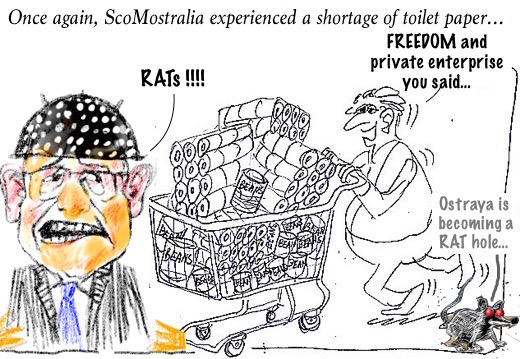Search
Recent comments
- crummy....
16 hours 12 min ago - RC into A....
18 hours 5 min ago - destabilising....
19 hours 9 min ago - lowe blow....
19 hours 40 min ago - names....
20 hours 17 min ago - sad sy....
20 hours 43 min ago - terrible pollies....
20 hours 53 min ago - illegal....
22 hours 4 min ago - sinister....
1 day 27 min ago - war council.....
1 day 10 hours ago
Democracy Links
Member's Off-site Blogs
toilet economics alla scomo...
 rats
rats
At its heart, economics is fundamentally the social science of distribution — who gets what.
And, right now, the pandemic has thrown a spanner into the works: no-one, or at least, very few people, are able to get everything they want or, in many cases, even need.
Fresh food shelves have been stripped bare in thousands of stores around the country, rapid antigen tests can't be found for love nor money and even the ubiquitous painkiller paracetamol is in short supply.
In some cases, this is due mainly to extraordinary demand, both genuine need and panic-induced, but in others, it's a lack of supply.
While these supply chain disruptions are temporary, they have exposed a greater truth about some of the key failings of orthodox economics and the policies and practices based on it, as have other events in the pandemic.
Which workers are really essential?Who do we miss most when they don't turn up to work?
If I couldn't work from home and write this column, would it inconvenience you in the slightest?
If your employer's CEO was out of action for a fortnight, would it affect your work?
Federal parliament hasn't sat for a month and a half and won't sit again until the second week of February. How many of us even noticed?
On the other hand, if your garbage collection doesn't turn up this week and your bin is overflowing, it'll certainly catch your attention.
When you turn up to the supermarket to buy fresh produce for dinner and the shelves are bare, it's more than a minor annoyance.
Read more:
https://www.abc.net.au/news/2022-01-17/economics-set-for-post-pandemic-shake-up-covid-19/100756832
FREE JULIAN ASSANGE !!!!!!! NOW !!!!!!
- By Gus Leonisky at 17 Jan 2022 - 9:48am
- Gus Leonisky's blog
- Login or register to post comments
free enterprise alla scammo...
The country's competition watch dog is referring some reports of significant price hikes on COVID-19 rapid antigen tests (RATs) to the Australian Federal Police (AFP).
Key points:The Australian Competition and Consumer Commission (ACCC) has received over 1,800 reports from consumers about the self tests since Christmas Day with 90 per cent concerned about pricing.
Most of the reports are from NSW.
ACCC chair Rod Sims said tests had been retailing in some areas at $20 to 30 per test, with some over $70 a test at smaller retail outlets.
This is despite wholesale costs ranging from between $3.95 and $11.45 a test.
"The pricing between $20 and $30 is extremely concerning and, as I say, above $30 [is] just beyond outrageous," Mr Sims said.
The ACCC has contacted more than 40 test suppliers, major retailers and pharmacy chains seeking information about their costs, pricing and stocks.
Around 47 per cent of the of the reports are related to pharmacies with convenience stores, tobacconists and supermarkets accounting for 15 per cent and petrol stations 15 per cent.
While suppliers are generally able to set their own prices, businesses must not make false or misleading statements about the reason for high prices.
In certain circumstances, excessive pricing of essential goods or services may also be unconscionable.
Businesses must also set their prices independently of their competitors and not collude about pricing.
Mr Simms said businesses found to be selling test for "excessive prices" could be fined up to $10 million. Individuals face fines of up to $500,000.
"If we found large stores and chains engaging in this sort of behaviour, we won't hesitate to take action and the penalties will be very large," Mr Sims said.
"Where it is individual stores, we still may take action by they are of such a size that penalties will be very painful for them."
The ACCC is referring reports to the Therapeutic Goods Administration of multipack tests, approved for use by clinical or professional users, being individually sold from multipacks. This includes tests being sold without instructions.
In cases where tests were bought from retailers and then sold at a mark-up above 20 per cent, the reports will be referred to the AFP as it is considered a breach of the Biosecurity Act which came into force on January 8.
"I am really hoping that companies hear this message and adjust their behaviour very quickly so that we get sensible pricing for all Australians as fast as possible," Mr Sims said.
The ACCC acknowledges RAT tests are in short supply, but maintains the extensive reports of price gouging are concerning.
"That is why we are writing to people, that is why we are giving them a chance to urgently explain what they are doing and what justifies the pricing they are charging," Mr Sims explained.
Read more:
https://www.abc.net.au/news/2022-01-17/accc-cracks-down-on-covid-19-rat-price-gouging/100761184
FREE JULIAN ASSANGE !!!!!!! NOW !!!!!!